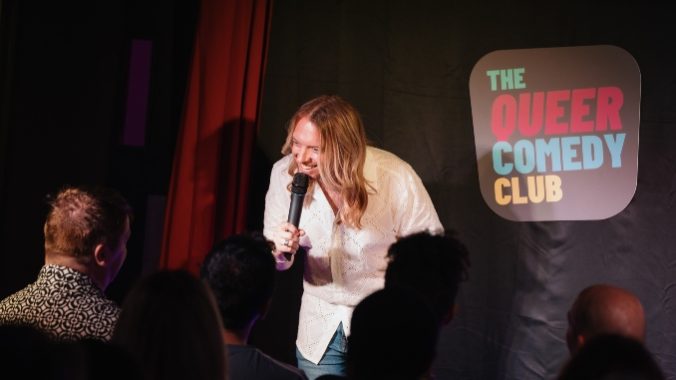Welcome to The Queer Comedy Club, Where Everybody Knows You’re Gay
Photo by Edward Moore / The Queer Comedy Club
London’s Queer Comedy Club wasn’t always a space. At first it was just a night, hosted once a month in a pub, usually Zodiac Bar or John the Unicorn. As it became more popular, co-founders David Ian and Kate Dale made the night weekly, catering to queer comedians of any level of experience.
“Eventually, I was just like, ‘Do you know what? I feel like getting something permanent. That’s a real statement: a physical space that people can come to’,” Ian tells me over Zoom. Ian comes from an acting background and met Dale through an LGBTQ+ dance company before either of them embarked on their comedy careers.
Once they decided to establish Queer Comedy Club as a physical place, the pair enlisted fellow comic Jeremy Topp as their third co-founder. As someone who often emceed or performed at their nights, Topp was a natural fit. And thus London’s first ever permanent LGBTQ+ comedy club was born.
While it’s surprising that QCC is the first of its kind in the UK’s capital, this space dedicated to the queer community could not come at a more vital time. Recent years have seen LGBTQ+ spaces targeted by far-right groups and conspiracy theorists, with these extremists often threatening drag events. Not to mention that the UK unfortunately boasts a small yet “vocal” minority of trans-exclusionary radical feminists (TERFs), as per sociologist Sone Erikainen.
All that to say, the Queer Comedy Club is providing a safe haven at a moment when the community could really do with not just a sense of security, but also a good laugh. Having a permanent venue means more to queer people than allies realize.
“That’s the thing about a physical place: it’s real. I can go here,” Dian Cathal explains to me over Zoom. Cathal is a comedian who’s been performing as a part of the QCC nights since the beginning, and he’s as prolific as he is funny. He’s doing five different shows at the Camden Fringe, including the play Deadnamed, which explores trans language.
Cathal understands the importance of having a physical space that just belongs to the club: “It’s not going to be like I’m doing a queer night in an otherwise very straight space. Because some of the open mics, they’ll be like, ‘Well, we had a queer venue. They want to do a rave that night, so we’ve been kicked to a pub.’ And then you just have the frattiest frat boys coming into the audience, and you’re like, ‘Oh no, I can’t do what I was going to do here.’”
Both Ian and Cathal say everyone feels they can wholly enjoy themselves because the emcees establish at the start of each show that “there’s no isms,” in Cathal’s words. They’ve fostered an atmosphere where LGBTQ+ people can fully embrace their identities, and therefore perform their most authentic (and therefore hilarious) comedy.
“Consistently, every single show, [the comedians and audience] talk about this environment. It’s about creating a public and honest space to just be yourself, and I think that allows people to do their best work. And that just creates a really fun time for everybody,” Ian shares.
But beyond that, this is a self-proclaimed queer space. You can make those jokes that outsiders wouldn’t normally get, and they actually land. Reading a room is important for any comedian, but there is a relief that comes with knowing the crowd will understand where you’re coming from.
“I tell a joke about how I’m very bad at being queer because I don’t like to rock climb,” Cathal tells me, later adding, “I have a belay certification. I just don’t like that I have it. So I think as a comedian, you can go further and you have little jokes and they just work so differently. And once you keep fostering that, then it just snowballs into the comedians feeling more comfortable, so the audience feels taken care of.”
-

-

-

-

-

-

-

-

-

-

-

-

-

-

-

-

-

-

-

-

-

-

-

-

-

-

-

-

-

-

-

-

-

-

-

-

-

-

-

-








































